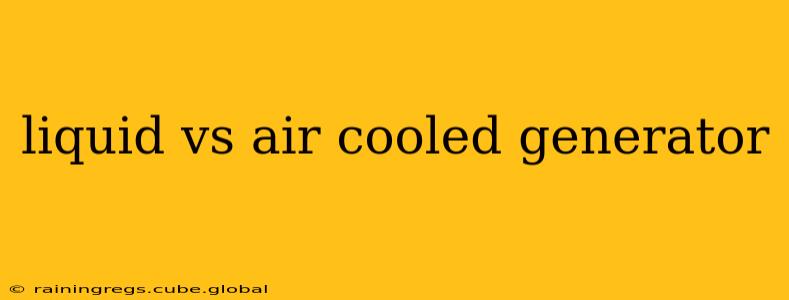Choosing between a liquid-cooled and air-cooled generator can feel overwhelming. Both types power homes, businesses, and industrial sites, but their internal cooling mechanisms drastically impact performance, lifespan, and application suitability. This comprehensive guide will dissect the key differences, helping you make an informed decision.
What is an Air-Cooled Generator?
Air-cooled generators utilize a simple, straightforward cooling system. Fans draw ambient air over the generator's engine components, dissipating heat generated during operation. This design is typically found in smaller, less powerful generators, often used for residential backup power or smaller construction sites. They're generally less expensive upfront than liquid-cooled counterparts.
Advantages of Air-Cooled Generators:
- Lower Initial Cost: The simpler design translates to a lower purchase price.
- Easier Maintenance: Fewer components mean less to maintain and repair.
- Lightweight and Compact: Ideal for portability and applications where space is limited.
Disadvantages of Air-Cooled Generators:
- Lower Power Output: Air cooling limits the generator's capacity to handle high loads and continuous operation. Overheating is a significant risk at high power outputs.
- Noisy Operation: The fans required for efficient cooling can be quite loud.
- Shorter Lifespan: Continuous operation at high temperatures can significantly reduce the engine's lifespan.
- Performance in Hot Climates: Air cooling efficiency diminishes significantly in hot environments, leading to potential overheating and performance degradation.
What is a Liquid-Cooled Generator?
Liquid-cooled generators employ a more sophisticated cooling system. A coolant (usually a mixture of water and antifreeze) circulates through the engine, absorbing heat. This heated coolant then passes through a radiator, where a fan dissipates the heat into the atmosphere. This superior cooling method allows for larger, more powerful generators, capable of continuous, heavy-duty operation.
Advantages of Liquid-Cooled Generators:
- Higher Power Output: Efficient cooling enables higher power output and continuous operation under heavy loads.
- Longer Lifespan: Consistent operating temperatures extend the engine’s lifespan.
- Quieter Operation: Liquid cooling often requires smaller, less powerful fans, resulting in quieter operation.
- Better Performance in Hot Climates: Liquid cooling remains effective even in high ambient temperatures.
Disadvantages of Liquid-Cooled Generators:
- Higher Initial Cost: The more complex design and additional components increase the upfront cost.
- More Complex Maintenance: Regular coolant checks and potential radiator issues add complexity to maintenance.
- Heavier and Bulkier: The added components increase the generator's size and weight.
- Potential for Leaks: The liquid cooling system presents a potential for leaks, requiring regular inspection.
What are the Differences in Maintenance?
Air-cooled generators require less frequent maintenance, mainly focusing on air filter changes, oil changes, and occasional fan inspections. Liquid-cooled generators demand more regular maintenance, including coolant level checks, coolant flushes, and radiator inspections. Both require regular oil and filter changes.
Which Type is Best for My Needs?
The ideal choice depends entirely on your specific requirements.
-
Air-cooled generators are suitable for applications needing temporary or intermittent power, such as occasional home backup or powering small tools on a construction site. Their affordability and portability are significant advantages in these scenarios.
-
Liquid-cooled generators are the superior option for continuous, heavy-duty applications, such as powering critical equipment in a data center or providing emergency power to a large facility. The increased lifespan and robust performance justify their higher upfront cost.
How Much Does Each Type Cost?
Pricing varies considerably based on power output, features, and brand. Generally, air-cooled generators are cheaper to purchase initially, while liquid-cooled generators command a higher price tag. However, the longer lifespan and reduced maintenance costs of liquid-cooled units might offset the initial investment over time.
What are the Fuel Consumption Differences?
Fuel efficiency can vary significantly based on the engine design and load. While not inherently superior, liquid-cooled generators, due to their often larger size and continuous-duty capabilities, may consume more fuel during prolonged, high-load operation compared to smaller air-cooled units under lighter loads. However, optimized engine designs in both categories continually strive for improved fuel economy.
Ultimately, the decision hinges on power requirements, budget, and intended application. Carefully consider the advantages and disadvantages of each type to select the generator perfectly suited to your needs.
